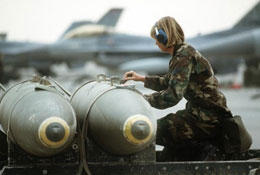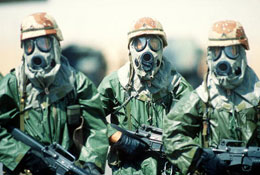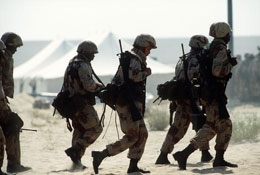Office of Research & Development |
 |
Office of Research & Development |
 |

CONTACT THE VABBB:
During work hours, we can be reached at 855-561-7827.
Mailed correspondence can be sent to:
VA Biorepository Brain Bank
VA Boston Healthcare System
150 South Huntington Ave
Boston, MA 02130
If you would like to be contacted by a VABBB staff member, please complete the Permission to Contact form and mail to the address above. Complete forms can also be faxed to our secure line at 857-203-3074.
Permission to Contact Form: (Note: This form can be completed electronically, but must be printed and signed/dated with ink.)
- Word version
- PDF Version
Approximately 697,000 men and women served in the 1990-1991 Gulf War. Nearly 250,000 Veterans have come down with illnesses in the 25 years since returning from the Gulf. A prominent condition affecting Gulf War Veterans is a cluster of medically unexplained chronic symptoms that can include fatigue, headaches, joint pain, indigestion, insomnia, dizziness, respiratory disorders, and memory problems. VA refers to these illnesses as "chronic multisymptom illness" and "undiagnosed illnesses." We prefer not to use the term "Gulf War Syndrome" when referring to medically unexplained symptoms reported by Gulf War Veterans. Why? Because symptoms vary widely. These illnesses include:
The exact cause of these disorders is not yet known. Researchers have been studying various hazards in the environment that Veterans experienced during their Gulf War service.
For additional information about ALS please visit the National Institute of Neurological Disorders and Stroke (NINDS)
The GWVI biorepository is a human tissue bank that collects, processes, stores and gives out specimens and health information for future scientific research studies. Veterans enrolled in the GWVIB brain bank are asked to complete surveys about their health every six months, and upon their death, donate their brain and other body tissue for future Gulf War research. Veterans can begin helping now by enrolling today, even though the tissue donation may occur many years from now.
 The VA GWVIB is seeking all Veterans from the 1990-1991 Gulf War era, who are interested in donating their brain and other body tissue after death for future research on the causes, progression and treatment of disorders of Veterans of the 1990-91 Gulf War. Research of this type must compare persons who are healthy with those who have health problems. As a result, all Veterans of the 1990-91 Gulf War eras may sign up for, or take part in, this study. This includes Gulf War era Veterans with symptoms and/or illnesses as well as those who do not have symptoms and/or illnesses. Veterans who were not deployed to the Gulf are also eligible to enroll.
The VA GWVIB is seeking all Veterans from the 1990-1991 Gulf War era, who are interested in donating their brain and other body tissue after death for future research on the causes, progression and treatment of disorders of Veterans of the 1990-91 Gulf War. Research of this type must compare persons who are healthy with those who have health problems. As a result, all Veterans of the 1990-91 Gulf War eras may sign up for, or take part in, this study. This includes Gulf War era Veterans with symptoms and/or illnesses as well as those who do not have symptoms and/or illnesses. Veterans who were not deployed to the Gulf are also eligible to enroll.
Scientists studying neurological disorders must compare brain tissue donated by people affected by these diseases with tissue from people who are not affected by them in order to understand the causes of these conditions, if you do not have a neurological disease or disorder please click here for information on joining the VA Biorepository Brain Bank.
It is never too soon to enroll in the GWVI Brain Bank. The health information you provide now will support current research, and upon your death, make your tissue donation even more valuable for future research. However, pre-enrollment is not required. Consent can be given by your next-of-kin immediately following death. We encourage interested individuals to talk with their families and friends about their intentions to be a brain donor. Talking about these issues now helps to reduce stress on your family at the time of your death.
 To take part in this study, you will be asked to review and sign a consent form. In addition to your consent, we will also need the consent of your next-of-kin (e.g., spouse, child, sibling) because this person will need to confirm your decision to donate after your passing. After signing the consent, we will ask you to fill out a questionnaire about your health history. We will update this information every six months to a year by telephone, by mail or by having you fill out a survey on an internet web site. The telephone call and questionnaire should each require around 30 minutes to complete. We will also look at your VA medical record (if you have one) to collect information about your health from time to time and add that information to the GWVIB database so that we can follow your health and care over time. This will not require any of your time. All your information that we collect will be labeled with a code that does not identify you directly.
To take part in this study, you will be asked to review and sign a consent form. In addition to your consent, we will also need the consent of your next-of-kin (e.g., spouse, child, sibling) because this person will need to confirm your decision to donate after your passing. After signing the consent, we will ask you to fill out a questionnaire about your health history. We will update this information every six months to a year by telephone, by mail or by having you fill out a survey on an internet web site. The telephone call and questionnaire should each require around 30 minutes to complete. We will also look at your VA medical record (if you have one) to collect information about your health from time to time and add that information to the GWVIB database so that we can follow your health and care over time. This will not require any of your time. All your information that we collect will be labeled with a code that does not identify you directly.
The body tissue that you donate will be collected at the time of your death and will not require any surgery or collection procedures at this time. Upon death, we would make arrangements for the donation. We are responsible for all costs related to your organ donation as well as transportation of your body to and from the site where the donation is recovered. However, we cannot assume the usual costs of the funeral, burial or cremation. If you have questions about VA death benefits please speak with your local benefits representative or visit the Veterans Benefits Administration web page for more information. The procedure will be done professionally and with dignity at the closest VA Medical Center or by medical professionals at another facility if the VA facility is unable to perform this in a timely manner. An open casket viewing is possible after donation if that is your family's wish. If your next of kin requests it, a copy of the pathology report will be provided when it becomes available.
 We hope that you consider such an important organ donation, but you are under no duty to do so. Your VA benefits and your VA health care cannot be influenced in any way by your saying yes or saying no to take part in this study. Your taking part in this study will not benefit you directly. However, your donation may help future efforts in the research of disorders of Veterans of the 1990-91 Gulf War. If you think that you might be interested in this generous after-death organ donation, the following information will explain what is involved for you and your family. You may also download our informational brochure here (link to brochure).
We hope that you consider such an important organ donation, but you are under no duty to do so. Your VA benefits and your VA health care cannot be influenced in any way by your saying yes or saying no to take part in this study. Your taking part in this study will not benefit you directly. However, your donation may help future efforts in the research of disorders of Veterans of the 1990-91 Gulf War. If you think that you might be interested in this generous after-death organ donation, the following information will explain what is involved for you and your family. You may also download our informational brochure here (link to brochure).
Thank you for thinking about this important issue. We have included some answers to frequently asked questions here.
We are always happy to answer any questions you or your family may have. During working hours, we can be reached at our toll free number: 1-855-561-7827.
More information about disorders of Veterans of the 1990-91 Gulf war and related VA benefits and programs can be found here.
Why enroll now? I plan to live for a long time.
The health information that you provide now, while living will support research now, and upon your death make your tissue donation much more valuable to future research.
I served during the 1990-1991 Gulf War but was not deployed to the Gulf. Am I still eligible to enroll in the GWVIB?
Yes! Any 1990-1991 Gulf War era Veteran may enroll.
I am listed as an organ donor on my driver's license. Does this automatically make me eligible for brain donation?
Being an organ donor via your license is a very generous and life-saving donation to the many people waiting for an organ transplant. However, this does not automatically notify brain banks of your intention to donate your brain. A person intending to make a brain donation must sign up with a brain bank such as the VABBB before death. In cases where a person had wished to be a brain donor but was unable to sign up before death, family members may contact the brain bank to approve the donation as long as it is done immediately after death.
What if I already have my decision to donate written in my will?
By the time your will is read, it will be too late to recover your tissue. Enrolling now and telling your family that you want to donate is the best way to ensure that your wishes are carried out.
Will my family have to pay any costs if I decide to become an after-death organ donor?
No, we are responsible for all costs related to your organ donation as well as transportation of your body to and from the site where the donation is recovered. However, we cannot pay for the usual costs of the funeral, burial or cremation.
How soon after death must the organs be recovered?
We hope to recover the donated organs within 24 hours, although under certain circumstances, the time frame may be longer.
My family feels strongly about a wake with an open casket viewing. With an organ donation, will this still be possible?
Yes, the donated organs will be recovered in a manner that will not interfere with an open casket viewing.
What happens to donated tissue?
Donated tissue is sent to a VA-approved biorepository storage facility for analysis and storage. Researchers from around the country may request tissue samples to conduct approved research. Tissue requests from investigators are reviewed by an established review process approved by the VA Central Office (VACO) in Washington, D.C.
How will my confidentiality be protected?
The Veterans Health Administration complies with the requirements of the Health Insurance Portability and Accountability Act (HIPAA) of 1996 and its privacy regulations and all other applicable laws that protect your privacy. We will protect your information according to these laws.
I am in favor of contributing to medical research, but I'm not sure of my religion's position on organ donations. What should I do?
If this is of concern to you, you should consult with your religious leader. Many religions, but not all, have eliminated opposition to organ donations.
Who should I talk to about donating?
It is important that your family and doctor know your wishes in the event you become unable to make your own health care decisions. Please know that you or your family may change the decision about donating at any time. If you are interested in taking part, or have additional questions, please call the Gulf War Veterans’ Illnesses Biorepository brain bank at our toll free number: 1-855-561-7827.
Research tissue request procedures for investigators
The Veterans Affairs Biorepository Brain Bank (VABBB) was established in 2006 to promote and support research in amyotrophic lateral sclerosis (ALS) and other illnesses that affect Veterans by collecting brain and spinal cord tissues, along with relevant clinical data, essential for such research. ALS researchers are invited to apply for tissue and data collected from Veterans with ALS.
For a current description of our tissue inventory click here.
Timeline and Review Process: Applications may be submitted at any time, and are reviewed monthly.
Application submission:
Regular Projects:
Principal investigators (PIs) who have the necessary preliminary data to support the use of greater numbers of specimens (regular project) should submit a request using the Tissue Request Form. In addition, the guidelines also provide information about numbers and types of specimens that may be requested for regular projects.
Pilot Projects:
Requests for access to tissue for pilot projects are limited to the amounts described in the VABBB Tissue Request Guidelines. Investigators who have pilot projects in which there is limited preliminary data should submit a request using the Tissue Request Form.
Investigators are highly encouraged to discuss their requests with the VABBB before submitting an application, by contacting Dr. Ian Robey at [520-792-1450x4436 or Ian.Robey@va.gov].
Additional Tissue Requests for Approved Projects
PIs that have already been approved for tissue may submit requests for additional samples on the same project by submitting the Tissue Request Short Form.
Tissue Request Forms may be requested from Dr. Ian Robey @ Ian.Robey@va.gov.
Justification of Tissue Requests: Applications should be carefully prepared to justify and fully describe the tissue requested. A statistical justification is required to assure that the proposed study is adequately powered to test the hypothesis in question. Sample size and power analyses should be considered before submitting a request. To conserve irreplaceable tissue the VABBB may require investigators to perform pilot studies to demonstrate feasibility before supplying greater numbers of specimens. In certain situations, if a request has been made for highly sought after tissue the VABBB may suggest alternative tissue. Investigators are highly encouraged to discuss their requests with the VABBB before submitting an application, by contacting Dr. Ian Robey at [520-792-1450x4436 or Ian.Robey@va.gov].
Review Process: All applications for access to tissue will be reviewed monthly by a panel of subject matter experts and the VABBB Executive Committee. Final decisions about access will be made on the basis of qualifications of the investigator, scientific merit of the proposed research utilizing the tissue, quantities of tissue requested, statistical issues and availability of tissue.
Material Transfer Agreements: Investigators will be required to submit signed Material Transfer Agreements (provided by the VABBB) before specimens are shipped for approved requests.
Progress Reports: Investigators receiving specimens will be required to submit progress reports for all approved projects on a yearly basis.
VA Specimen Research and Biobanking Program
The VA Specimen Research and Biobanking Program makes tissue samples available for research on illnesses in Veterans. Researchers can often learn more about illnesses in Veterans by using samples of tissue, blood, urine, and other fluids. These samples are often stored for future studies in biobanks. Biobanks store, process and give out human biological samples for important research studies. These samples are very valuable for research.
The VA has set up Amyotrophic Lateral Sclerosis (ALS) and Gulf War Veterans Illness Brain Banks to study these illnesses because they can occur in Veterans. Click on the links below for more information.
For more information or to donate tissue:
Click here for the Gulf War Veterans Illness Brain Bank and the VA Biorepository Brain Bank for Amyotrophic Lateral Sclerosis (ALS)
For information on VA specimen research and tissue banking:
Click here for VA specimen research and tissue banking.